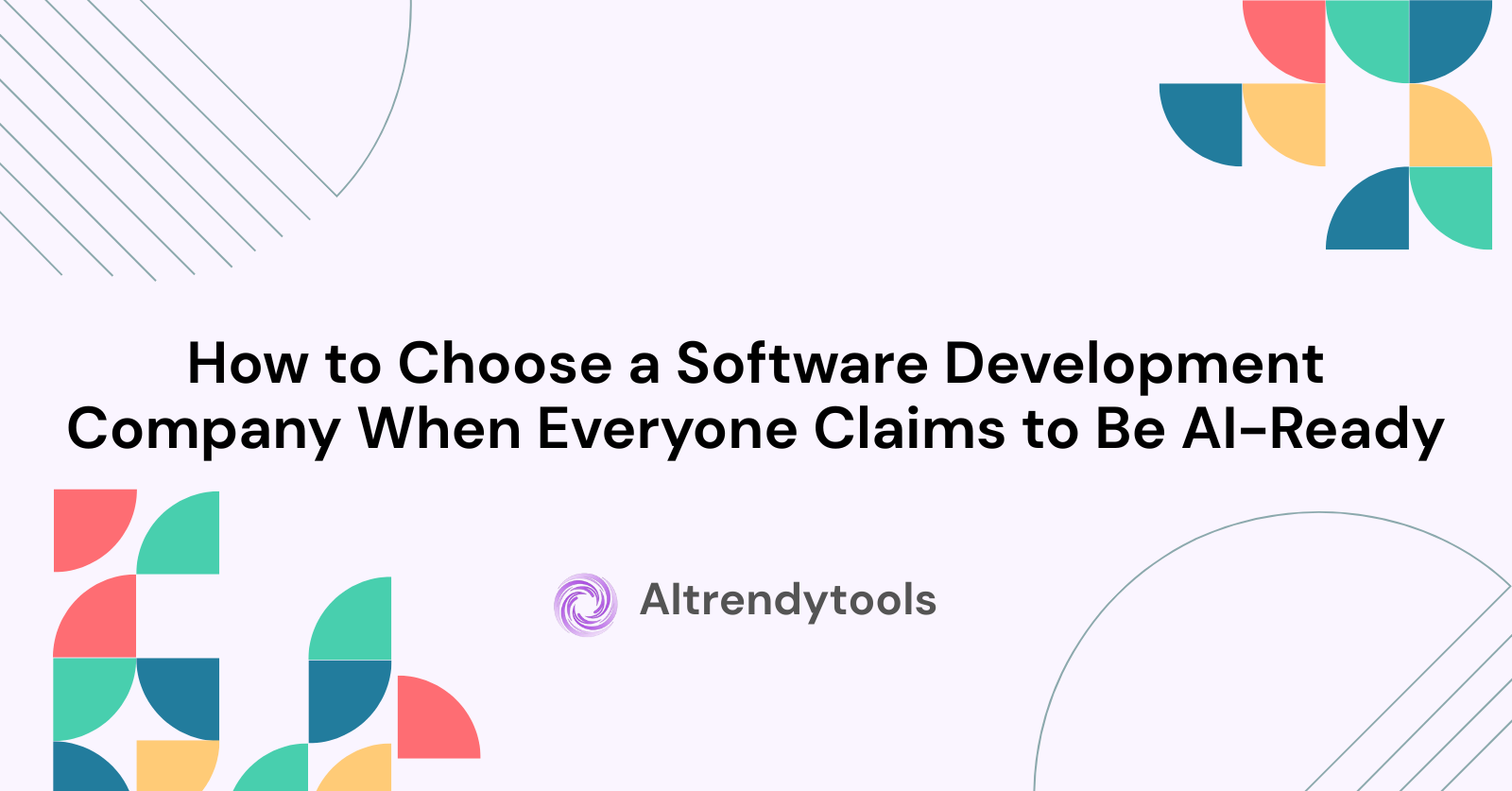🔥 AITrendytools: The Fastest-Growing AI Platform |
Write for usHow to Choose a Software Development Company When Everyone Claims to Be AI-Ready
Learn how to choose a truly AI-ready software development company. Spot real expertise, avoid hype, and find partners who deliver measurable results.
Sep 28, 2025
The AI hype train is moving fast. Everyone’s jumping on board, waving banners that scream “AI-ready!” But when it comes to picking a software development partner, those claims can feel like shouting into the void. How do you separate the genuine AI-savvy teams from those just sprinkling buzzwords in their proposals? It’s trickier than it seems—but not impossible.
The “AI-Ready” Illusion
Let’s get real: not every company waving the AI flag actually knows what to do with it. Some firms throw in a few machine learning demos and voilà—AI expertise? Not quite. True AI competency requires more than familiarity with TensorFlow or PyTorch. It demands understanding the full lifecycle: from problem framing to data collection, model training, deployment, and ongoing maintenance.
Think of it like cooking. You might know how to chop vegetables, but that doesn’t mean you can whip up a Michelin-star-worthy meal. Similarly, a company might dabble in AI projects, but delivering meaningful results—ones that actually align with your business goals—is a different ballgame.
Why the Hype Matters Less Than You Think
When everyone claims AI readiness, the real differentiator becomes process, transparency, and adaptability. You need to look beyond flashy demos or marketing decks. Ask yourself:
- How does the company approach AI project scoping?
- Do they integrate AI thoughtfully or just tack it on?
- Can they explain trade-offs, model limitations, and potential biases clearly?
A study by Gartner found that nearly 70% of AI initiatives fail—not because AI doesn’t work, but because of unrealistic expectations, poor data quality, or misaligned strategies. You’re not hiring just a developer; you’re bringing in a collaborator who can navigate these pitfalls with you.
Start with Your Goals, Not the Tech
It sounds obvious, but it’s worth repeating: start with the problem, not the tool. Are you trying to automate customer service? Predict churn? Detect anomalies in transactions? Your objectives should dictate the technology, not the other way around.
Here’s where many stumble: they get dazzled by AI’s potential and forget the fundamentals. AI isn’t magic. It won’t solve fuzzy problems without a clear objective and clean data. By articulating your goals first, you set the stage for meaningful discussions with prospective vendors.
Check for Real AI Expertise
So what signals real expertise? Here’s what to look for:
- Portfolio Depth – Not just one-off chatbots. Look for a range of AI applications—predictive analytics, recommendation engines, NLP, or computer vision.
- Data Strategy – AI is only as good as the data behind it. Ask about data pipelines, cleaning processes, and compliance with privacy regulations like GDPR or HIPAA.
- Model Transparency – Can they explain how their models make decisions? Avoid teams that hide behind black-box solutions.
- Continuous Learning – AI models need updates. Check if they have mechanisms for ongoing monitoring and retraining.
Top 5 AI-Ready Software Development Companies Worth Considering
Not all AI-ready firms are created equal. Here’s a snapshot of five companies demonstrating strong AI integration in software development, based on real-world case studies, expertise, and thoughtful execution.
1. Relevant Software
Relevant Software has been recognised for its structured approach to AI in software products. Instead of chasing every shiny tool, they focus on aligning AI solutions with business goals, ensuring data quality, and maintaining transparency in model decisions. Their portfolio spans predictive analytics, recommendation engines, and natural language processing projects—showing both versatility and depth.
2. Iflexion
Iflexion brings two decades of experience delivering robust software solutions, including AI-infused applications. Their strength lies in creating enterprise-grade systems that integrate machine learning in a practical, goal-oriented manner. Clients often highlight their ability to handle complex data pipelines and legacy system integration seamlessly.
3. Altoros
Altoros has carved a niche in cloud-native development and blockchain projects with AI components. Their teams emphasize modular architecture and scalable AI solutions, making it easier to iterate and optimize models while keeping infrastructure costs manageable.
4. DataArt
DataArt combines software engineering with AI expertise across industries like healthcare, finance, and logistics. They focus on custom solutions that respect both regulatory requirements and real-world data constraints, ensuring AI outputs are actionable and reliable.
5. ELEKS
ELEKS is known for delivering AI solutions that integrate into existing business processes without disruption. Their approach highlights ethical AI practices, model interpretability, and strong collaboration with client teams, helping mitigate common pitfalls in AI projects.
Team Composition Matters More Than You Think
It’s easy to fixate on technologies, but remember: software is built by humans. A talented, multidisciplinary team can make or break your AI initiative.
- Data Scientists bring the math and algorithms.
- ML Engineers handle deployment and optimization.
- Backend Developers ensure integration with your existing systems.
- UX/UI Designers make AI approachable for end-users.
Check if the team can work as a cohesive unit, not just as isolated experts. Poor collaboration can turn even the most sophisticated AI project into a frustrating mess.
Ask About Real-World Challenges
Numbers look great on paper, but real experience speaks louder. Ask about challenges they’ve faced:
- Did they deal with sparse or noisy data?
- How did they handle model bias?
- Have they integrated AI into legacy systems before?
Their answers reveal both technical skill and problem-solving mindset. One common red flag is overconfidence. If a company promises your AI project will be flawless from day one, take a step back. Real AI work involves iteration, testing, and yes—occasional failure.
Don’t Forget Cultural Fit
You might think cultural fit is fluff, but it’s critical. AI projects often require ongoing collaboration, adjustments, and sometimes pivoting strategies mid-course. You want a partner who communicates clearly, listens, and shares your vision for the product.
A misaligned team can slow down timelines, inflate costs, or compromise quality. Look for transparency in their processes and a willingness to adapt to your workflow—not just impose theirs.
How to Evaluate Communication Skills
Even the sharpest technical minds can’t carry a project if they can’t articulate ideas. Here’s what to look for:
- Clarity over jargon – Can they explain complex AI concepts without drowning you in buzzwords?
- Responsiveness – Do they answer questions promptly and thoughtfully?
- Documentation – Are their deliverables clear, structured, and accessible?
Effective communication ensures that both parties are on the same wavelength, reducing the risk of costly misunderstandings.
Balancing Cost and Value
Let’s be honest—AI expertise doesn’t come cheap. But the cheapest option isn’t always the worst, and the priciest option isn’t automatically the best. What matters is value: what you get relative to your goals.
Think in terms of ROI. Will the AI solution they propose meaningfully improve efficiency, revenue, or user experience? Or is it just a shiny experiment? True value comes from a combination of technical excellence, strategic insight, and a partner who understands your business.
Red Flags to Watch For
Here are a few warning signs that might indicate trouble ahead:
- Excessive reliance on pre-built AI tools without customization.
- Vague answers about past projects or results.
- Reluctance to discuss data privacy, security, or compliance.
- Overpromising timelines or claiming AI can solve everything immediately.
Trust your instincts here—if something feels off, dig deeper.
Making the Final Decision
After filtering based on goals, expertise, and culture, you should have a shortlist. At this stage, try:
- Trial Projects – A small, low-risk engagement can reveal a lot.
- References – Talk to previous clients about outcomes, collaboration, and challenges.
- Work Samples – Ask for code snippets, dashboards, or reports they’ve created.
These steps help ensure that what looks good on paper translates to real-world success. It’s also a reminder that in today’s AI-driven business climate, choosing the right partner - whether a software development company, an SEO agency, or a marketing firm - means looking beyond surface claims and focusing on proven results.
Wrapping Up the AI Puzzle
Choosing a software development company in the age of AI isn’t about finding someone who can throw around the right terminology. It’s about finding a team that understands your problems, can navigate the messy realities of AI projects, and communicates clearly along the way.
Remember: the AI hype is loud, but practical, thoughtful, and experienced teams speak through results—not marketing. By focusing on goals, evaluating expertise rigorously, and prioritizing collaboration, you’re far more likely to pick a partner who turns AI potential into measurable outcomes.
Summing It Up
- Start with your objectives, not AI technology.
- Look for depth in experience, data handling, and transparency.
- Evaluate the team composition and collaboration skills.
- Pay attention to real-world problem-solving stories.
- Cultural fit and communication are just as important as technical chops.
- Focus on value and measurable outcomes over flashy demos.
AI readiness is less about the label a company wears and more about the substance behind it. Ask the right questions, trust your instincts, and partner with teams who have proven their chops, whose track record shows that AI competence is best demonstrated through thoughtful execution rather than empty claims.
🚀 Submit Your Tool to Our Comprehensive AI Tools Directory
Get your AI tool featured on our complete directory at AITrendytools and reach thousands of potential users. Select the plan that best fits your needs.





Join 30,000+ Co-Founders
Related Blogs
Maharashtra Times: Maharashtra's #1 Marathi Newspaper
Maharashtra Times (मटा) is Maharashtra's #1 Marathi newspaper since 1962. Read today's ePaper, download the free app & get live news from Mumbai, Pune & beyond.
MovieSwap: The Bold Idea to Free Every Movie Ever Made
MovieSwap wanted to let you stream any movie ever made legally. Discover why this bold Kickstarter idea failed and what it means for film fans today.
RapiCredit Review 2026: Fast Loans in Colombia?
Get cash fast with RapiCredit Colombia's top fintech lender. See real rates, requirements & honest reviews before you apply. Is it right for you in 2026?
Submit Your Tool to Our Comprehensive AI Tools Directory
List your AI tool on AItrendytools and reach a growing audience of AI users and founders. Boost visibility and showcase your innovation in a curated directory of 30,000+ AI apps.





Join 30,000+ Co-Founders

